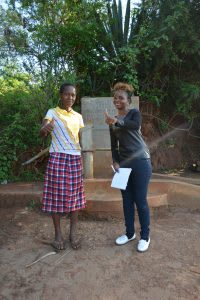This project is a part of our shared program with Africa Sand Dam Foundation. Our team is pleased to directly share the below report (edited for clarity, as needed).
Welcome to the Community
The Maiuni Self-Help Group is of Kithuiya village, Kiambwa sub-location, Kiteta location, of Kiteta division. Kithuiya Village has a population of 1050 people. (Editor’s Note: While this many people may have access on any given day, realistically a single water source can only support a population of 350-500 people. That's why a five-year program to access clean water and good hygiene makes so much sense! To learn more about this, click here.) The self-help group was formed in the 2011 by a total of 46 members, with 33 members being female and 13 males. The primary reason for forming the group was to increase water security for the area's residents. Other reasons were soil conservation through digging terraces; starting horticultural projects i.e. planting vegetables and fruit trees; and merry-go-round (a community fund-sharing program) to help members raise income that could help in paying school fees and meeting other basic needs.
Maiuni Self-Help Group has been working with ASDF for the last four years. Its top two priorities have been to increase water's availability through the construction of sand dams, and to conserve soil on farms through terracing and planting trees. The group has been able to construct two sand dams already. The sand dams have changed the lives of many community members, providing them with access to water throughout the year. The self-help group members have been able to grow great harvests, thus improving their family income levels. And more members of the community have started planting vegetables, which creates a greater water demand, and thus results in the community considering this construction of an additional water point to be used specifically for drinking.
Water Situation
Locals are getting water from their two sand dams. To access the water on reserve at the dams, scoop holes must be dug. These holes fill with water from the water table. Unfortunately, they are also open to contamination from surface runoff and human and animal activity. The water fetched from these scoop holes has greatly aided farmers in agriculture and domestic chores, but is not safe for drinking.
Women and children use 20-liter jerrycans for water, covering the water during the trip back home. Once water is returned home, it is dumped into a larger barrel with a 100 to 200-liter capacity. Water containers are cleaned once a week. You can see examples of these water containers under the "See Photos & Video" tab; both Winnie and Ruth have small containers for fetching water and larger ones for storage.
Sanitation Situation
Since the Maiuni Self-Help Group has already worked on their water and hygiene program for four years, their knowledge of important facilities, tools, and healthy practices is extensive. All households have a pit latrine, though each in a different condition according to income level. The cheapest are made of mud, while the most expensive are made of cement and include ventilation systems. These same families also have a dedicated room for personal hygiene, where members bathe, brush teethe, or cut their nails. About 75% of these homes have a usable hand-washing station, and most have dish racks and clotheslines.
Plans: Hygiene and Sanitation Training
The benefits of training haven't even been limited to Maiuni Self-Help Group alone. Group members have been sharing their knowledge with all families, with or without membership. They want to see their entire village improve. Self-help group member Aaron Mbuva said, "After learning how to make tippy-taps (a type of hand-washing station) and treating water, we have also been sharing this with our neighbors who are not members of the self-help group. This will help reduce diseases for all families in the village!"
We will hold a review training that highlights the importance of keeping water containers clean. A session will also review water treatment methods such as chlorination and filtration. These sessions will be held over the course of one day.
Plans: Hand-Dug Well
This well is planned to be adjacent to the group's first dam, since the first dam has had the longest to mature. The mature sand dam has raised the water table enough that a hand-dug well will provide safe and adequate access to water, and the community hopes that this well will provide them with much cleaner water for use in their homes.
Construction for this well is projected to take about two months. The well will be lined with concrete and fitted with an AfriDev pump. Self-help group members will be trained on basic well maintenance, and have our contact information if anything major needs fixing.
Thank You for working with Maiuni Self-Help Group to unlock the potential of their community!

 Protected Dug Well
Protected Dug Well
 Rehabilitation Project
Rehabilitation Project

























